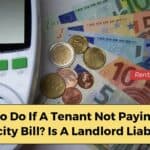Landlords have to provide a habitable and comfortable space for the tenants.
They have to provide furnaces, HVAC systems, water heaters, proper plumbing, sewage disposal systems, etc. to ensure that the tenant can have a comfortable and safe stay on the property.
The law does not mention anything about providing appliances to the tenants. However, some landlords do provide appliances to make the house more habitable and increase the rental value of their property.
When the landlord provides appliances, it is the duty of the tenants to use the appliances with care.
Though normal wear and tear due to regular use are permitted, tenants should not damage the appliances with irresponsible use.
They have to use the appliances and also look after their maintenance.
The issue of appliance repair and maintenance is the cause of conflict between landlords and tenants.
While the landlords feel that since the tenants use them, it is the tenants’ duty to look after the maintenance and repairs, tenants opine that landlords are responsible for the maintenance and repairs of the appliances.
Most landlords include an appliance clause in the rental lease that answers specific questions such as, whose duty it is to replace appliances in a rental property? When to replace the appliances in the property and who is responsible for appliance repair.
Tenants have so many questions on how to deal with appliances in the rental property. Here are some of the frequently asked questions on appliances.
What appliances is a landlord required to maintain by law?
Landlords are not required to provide appliances in rental property.
The warranty of habitability states that the landlord must provide working window locks, heating and cooling equipment, well-functioning electric and plumbing facilities, and trash disposal systems.
Though most tenants feel that landlords must provide appliances such as refrigerators, stoves, microwave ovens, etc. the law doesn’t mandate that.
However, most landlords include some appliances in their properties to entice renters and get a good price.
Are landlords responsible for the supply of light bulbs?
The answer to this question depends on the type of property you rented.
For single-family homes, the tenant is responsible to change the burnt-out light bulbs both inside and outside the home, unless the rental lease states that it is the landlord’s responsibility or the bulb is in a hard-to-reach area and requires professional help.
For apartment complexes, the tenant is responsible for replacing the indoor light bulbs while the landlord takes care of the light bulbs in common areas such as parking lots, staircases,
It is important to take a close look at the lighting fixtures and bulbs in the property during the walk-through.
You can take a note of which ones are your responsibility and what can be left to the landlord. Also, inspect the condition of the light bulbs and ask for a replacement if they appear worn out.
Do landlords have to provide fans and Air conditioners?
The law regarding air conditioning differs from state to state. Most states consider air conditioning as an amenity and do not include it in the habitability standards. However, the unit has to be well ventilated with adequate windows and fans.
If the landlord provides an air conditioning system, he is responsible to maintain it. The landlord has to take care of the repair of the air conditioning if it gets damaged without negligence or misuse by the tenants.
Do landlords have to provide an oven?
Legally speaking landlords do not have to provide ovens and other kitchen appliances. However, it is a standard practice in some cities such as New York and California.
Most landlords furnish their units with ovens, stoves, refrigerators, and other appliances to make them competitive and attract good tenants.
Does a landlord have to provide a fridge and its repair?
It is not mandatory under the law for landlords to provide a fridge, unless the landlord agrees to provide it in the rental lease.
However, it is not uncommon to find rental properties furnished with appliances such as fridges, air conditioning, washing machine, etc.
When the landlord provides a fridge in the unit, it is his responsibility to take care of the repairs and maintenance of the fridge.
In case, the fridge is damaged by the carelessness of the tenant, then the tenant must get the repairs done.
Do landlords supply window coverings?
The rental unit must be well ventilated to meet the warranty of habitability. It should have an adequate number of fans and windows.
The windows must be in working condition with the window panes intact and functioning locks. However, the law does not specify window coverings.
Most landlords provide drapes, blinds, etc. to uplift the interiors and meet the expectations of their tenants.
How Long Appliances in Rental Properties Should Last?
Most appliances in rental properties would last for 8 to 12 years, and some would last for much longer. Appliances such as furnaces, boilers, and air conditioners will last for more than 12 years.
The durability of these appliances on their use and timely maintenance. Modern appliances are built to last for longer durations and can withstand high usage.
When you are renting a property, it is crucial to inspect the condition of every appliance in the unit. Know details about when it is bought, any repairs done, and its present condition.
Make a note of appliances that are not in good working condition and request the landlord to replace them before you move in.
Who is Responsible for Appliance Repair?
The responsibility for appliance repair is clearly spelled out in the rental lease. However, if it is not specified, the responsibility of repairs depends on who supplied the appliance and how the damage occurred.
1. Appliances supplied by the landlord
When the owner supplies the appliances, it is his responsibility to look over their maintenance and undertake any repairs caused due to normal wear and tear from time to time.
Not getting the repairs done can affect the warranty of habitability as it can lead to safety concerns for the tenant.
2. Appliances supplied by the tenant
If the appliances are supplied by the tenant, then the responsibility for their repairs and maintenance is on the tenant.
3. Appliances supplied by the landlord but damaged by the tenant
If the appliance supplied by the landlord gets damaged due to the negligence or misuse of the tenant then the responsibility of repair is on the tenant.
If you break the oven door or damage the refrigerator, it is prudent to discuss the issue with the landlord and work out an amicable solution rather than pinning the blame on the landlord.
When Should I Replace the Appliances in My Rental house?
Tenants are required to replace the appliances in the rental house when they damage the appliance through negligence or irresponsible use.
Sometimes, the rental lease puts the responsibility of replacing damaged appliances on the tenants, in such circumstances also the tenant will have to replace the appliance.
How do I ask my landlord for newer appliances?
If the appliances in your rental home are damaged beyond normal wear and tear, not working properly, or have simply become old, you can ask the landlord for newer appliances.
Before you send that email or make a phone call requesting the landlord, there are some critical points to note.
Check your lease terms
The rental lease contains all the details about the repair and replacement of the appliances provided by the landlord.
Re-read your lease and note whether the landlord is responsible for the replacement of damaged appliances.
Some landlords put the responsibility of repair and replacement on the tenant.
Even if the lease terms do not include the replacement, you can still request the landlord for newer appliances.
Check your local housing laws
The housing laws differ from state to state. However, the landlord must ensure that the property is safe and habitable for the tenants.
If the damaged appliance is affecting your safety or health, you can ask the landlord for replacement even when it is not mentioned in the rental lease.
Communicate with the landlord
Clear communication is the key to landlord-tenant relationships. Explain the condition of the appliance and how it is affecting you.
You can also discuss the cost-benefit analysis of replacing the old appliance. Offer to help the landlord in choosing a good quality appliance at a reasonable cost.
Though it is not required by the law, tenants have come to expect appliances such as ovens, air conditioning, washers, and dryers from the landlords.
Most landlords provide appliances to make the property competitive and attract good tenants.
Appliances and their maintenance are the issue of contention between the landlords and tenants.
To avoid disputes, tenants must carefully go through the rental lease to know what appliances are provided in the unit and who is responsible for their repairs and maintenance.
It is also crucial to examine the condition of the appliances in the unit while inspecting the property and make a note of it to avoid high repair costs as soon as you move in.



